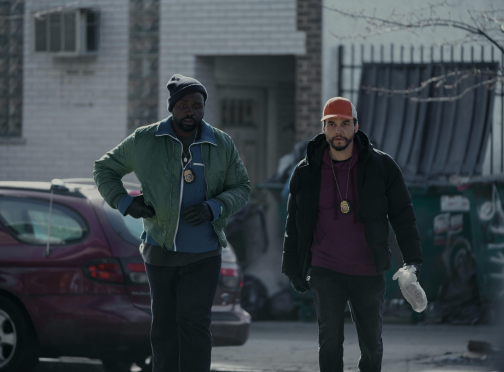


Violence Over Verve:
Apple’s Dope Thief Leans on Bloodshed When It Should Trust Its Characters
Apple TV’s Dope Thief, adapted from Dennis Tafoya’s award-winning novel, sets up a lean, familiar premise. Two longtime friends make a living posing as DEA agents knocking over low-level Philadelphia drug dealers at gunpoint. Ray Driscoll (Brian Tyree Henry) acts as the calculated planner, running reconnaissance, while Manny Carvalho (Wagner Moura) serves as the volatile, impulsive partner, who would rather find spiritual redemption than persist in their criminal enterprise.
Both justify their crimes through the women they love. Ray, despite his hardened exterior, funnels cash to Theresa (Kate Mulgrew), the woman who raised him, his incarcerated father’s girlfriend. Manny, desperate to escape the hustle, dreams of marrying Sherry (Liz Caribel Sierra), by scraping together enough scratch to give her a life beyond the streets.
Feeding them targets is Son Pham (Dustin Nguyen), a Vietnamese crime boss with his own hidden agenda. Ray and Manny, both battling addiction and stagnation, take on a job when an old prison buddy pitches a high-stakes job in the boondocks. However, the job spirals out of control fast when their newest recruit accidentally shoots and kills an undercover federal agent while wounding another.
Now, they’re marked. Cartel enforcers. Biker gangs. Federal agents (Amir Arison, Marin Ireland) working at cross-purposes. Ray’s estranged father (Ving Rhames) is dragged into the mess as leverage by the authorities, while a fleeting love interest and a corrupt federal agent add to the chaos.
Written by Oscar nominee Peter Craig, with executive producer credits for Henry and Ridley Scott, Dope Thief should deliver more than standard crime drama fare. Instead, its eight episodes lean too heavily on gratuitous violence and plot holes. The eight episodes move between taut, effective tension—Ray finds three mutilated bodies in the drug house bust gone wrong—and bloated action set pieces that add little beyond carnage. A prolonged gang shootout, meant to blend grit with dark humor, drags on, its impact dulled by excess.
Episode five stumbles into exposition quicksand. Ray and Manny, closing in on the gang chasing their stolen loot, land in an Amish community linked to the botched stash-house heist. A local, unprompted, fills in key plot gaps, reducing the mystery to a monologue. Worse, the story’s unseen puppet master, delivering menacing whispers to Ray over the phone, sounds distractingly like Saw’s Jigsaw. And when they finally step into the narrative as their everyday character, no one acknowledges the glaring vocal resemblance.
What gives Dope Thief its real weight stems from Manny and Ray’s friendship, frayed, tested, but unshakable, delivered with electric chemistry by Henry and Moura. Their performances crackle with raw history, stretching back to petty kid hoodlums, elevating their bond beyond cliché. Ray sees himself as Manny’s guardian; Manny aches for respect and control over his own fate. Their dynamic breathes life into an otherwise formulaic crime thriller, with concern for each other palpable. Both bring enormous emotional rage to their characters that transcend their other, more famous performances. Watching the two together reminds of some of the best on-screen buddy relationships.
Kate Mulgrew, as Theresa, is another winner, stealing every scene. Tough, whip-smart, maternal with an edge—her love for Ray cuts through the cynicism. She delivers each line with a bite, yet her care lingers in every sharp-tongued rebuke. Every moment of her on screen is a joy to watch.
At its best, the series pulses with raw emotion and lived-in camaraderie. Despite flashes of brilliance, Dope Thief never fully earns its place among the genre’s greats.